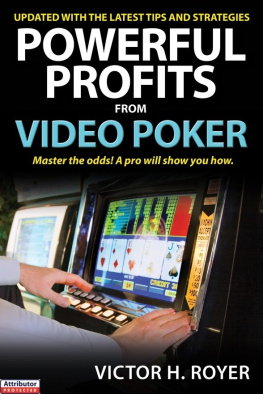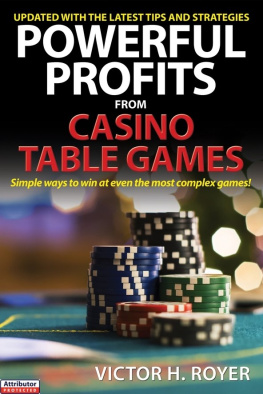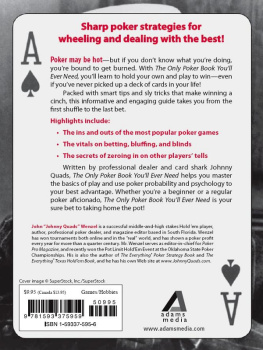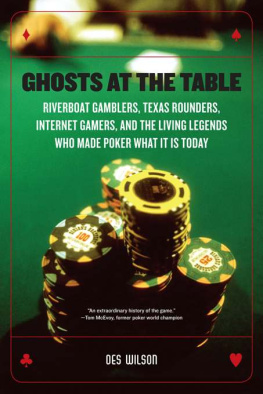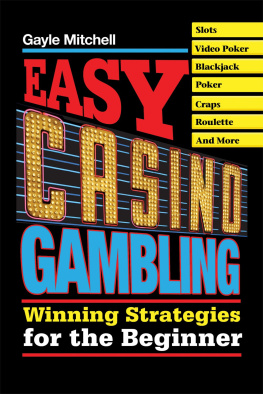You Bet!
An A-Z of Poker, Casinos & Lotteries
Over 600 entries detailing the Stories, History, Law, Theories, Personalities, Slang, Word Origins, Terms, Trivia, Games, Legends, Scams, Stings, Scandals, Coups, Winners....and Losers
Liam OBrien
2014 Liam OBrien
Liam OBrien has asserted his rights in accordance with the Copyright, Designs and Patents Act 1988 to be identified as the author of this work.
First published in eBook format in 2014
ISBN: 978-1-783-01291-6
All rights reserved under International and Pan-American Copyright Conventions. By payment of the required fees, you have been granted the non-exclusive, non-transferable right to access and read the text of this e-book on-screen. No part of this text may be reproduced, transmitted, downloaded, decompiled, reverse-engineered, or stored in or introduced into any information storage and retrieval system, in any form or by any means, whether electronic or mechanical, now known or hereinafter invented, without the express written permission of the Publisher.
eBook Conversion by www.ebookpartnership.com
The page references in this index correspond to the printed edition from which this eBook was created. To find a specific word or phrase from the index, please use the search feature of your eBook reader.
Other books by Liam OBrien
What are the Odds? An A-Z of Sports Betting
Whats the SP? Betting on Racing: An A-Z
Dont Bet the Farm The Encyclopedia of Betting and Gambling
Contents
Introduction
Lotteries, Casinos and Poker have been around for hundreds of years but their roots stretch back much further back into the mists of time as numerous variations of games of chance were used by traditional societies to forecast the future, to interpret divine messages and even to gamble. Poker is a relative newcomer on the gambling scene only dating back to the early 19th century but card playing in some form has been around for up to a thousand years before that. Lotteries as we know them have existed since the 15th century and before long, they were providing funding for state infrastructure projects, financing colonial adventures and even providing a form of taxation for nation building. By the mid 17th century, the first purpose built casino had appeared on the scene in Venice and theconcept began to find its way throughout Europe and beyond. The spread of organised gambling has ebbed and flowed depending on public opinion and state ideology but a recurring element was its adaptability to service a market that never went away. As technology evolved from the printing press to the telegraph to the telephone and to the internet, gambling found another niche. If it was made illegal, it either went underground usually with far more negative consequences or it simply moved elsewhere.
Rolling forward to the 21st century, the lines of demarcation have become increasingly blurred and gambling is ubiquitous; traditional betting shops now resemble mini casinos, mobile phones are portable gambling devices and the internet brings thousands of online casinos into peoples homes. Poker sites and betting exchanges can get people from opposite sides of the world gambling with each other without leaving their bedrooms. The idea of state monopolies or illegality is becoming increasingly irrelevant unless the state is prepared to take extreme action against online transactions as has happened in the United States. For some people gambling has provided the means of escapism, a bit of fun, a chance to dream beyond lifes mundane realities. For others it has provided a revenue earner or even a livelihood, either working in the gambling industry side based on the house edge, the mathematical built in bias which occurs in most gambling games and markets or alternatively, for the relatively small numbers who have the ability to beat that edge. Organised gambling may indeed be playing an increasing role in modern life life but nevertheless for most it remains a minor leisure activity, a combination of entertainment, escapism, luck and sometimes skill but for those who see it as an integral part of their life, there should be only two choices; either get good at it or quit. This book doesnt promise to do either but it will take you on a rollercoaster ride through the world of poker, lottery and casino gambling.
Chronology
3000 BC Earliest known six-sided dice made around this time in what is now Iraq.
2560 BC A tablet at the Great pyramid of Giza tells the story of how Thoth, the god of night, gambled with the moon to win five new days to add to the calendar.
2300 BC Go; a strategy game played by two people in whom spectators can bet is played in China.
200 BC Keno, a lottery type game is first played in China.
10 BC Julius Caesar restricts gambling in Rome to the Saturnalia festival.
Roman soldiers draw lots for the clothes of Jesus Christ.
Byzantine Emperor and head of Orthodox Church Justinian I issues the Corpus Juris Civilis of civil and canon law, in which gambling in public and private houses is banned.
Arab caliph Abd al Malik distributes the wealth of Syria among his army officers with a series of coin tosses.
Holy Roman Emperor Louis the Pious rules that gambling clergy will be suspended from office for three years.
1190 Gambling is forbidden for those below the rank of knight during the Third Crusade.
1377 Swiss monk Johannes von Rheinfelden writes of a new card game of 52 cards with four suits.
1388 Dicing banned under Richard II as it was considered to be disrupting archery practice.
1394 Dukes of Saxony and Letzburg play cards for an unenclosed portion of the forest of Ardennes.
1423 Public burning of playing cards in Bologna after a sermon by Bernadine of Siena.
1440 First full deck of cards printed.
1444 The earliest recorded lottery in which participants pay an entry fee is held in Sluis (L'cluse) in the Netherlands to raise funds to repair the city's walls and fortifications.
1446 Widow of Flemish painter Jan Van Eyck raffles his remaining works.
1461 Parliament under King Edward IV prohibits card and dice games, except at Christmas.
1466 First recorded lottery to involve buying of tickets and distribution of prize money is held in Bruges in Belgium to raise money for the towns poor.
1477 Parliament introduces legislation that house owners can be prosecuted for allowing premises to be used for games of chance.
1495 Legislation allows the lower classes to gamble during the Christmas period.
1515 Elections to the Genoa Senate carried out by lottery.
1520 Francis I of France legalises lotteries in five cities, the first lotteries to have royal assent.
1526 First record of the Groom Porter, official in charge of organising royal gambling in England.
1530 The first publicly run European lottery commences in Florence, raising money for public works.
1541The Bill for maintaining Artillery and Debarring unlawful Games bans many games and gaming houses apart from during Christmas.
1566 Royal assent is given to hold a British state lottery.
1569 The first government run lottery draw in Britain takes place.


